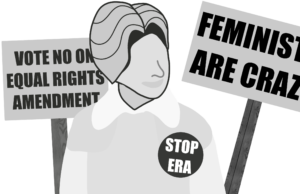The F Word: Modern day feminism sparks debate over gender equality

If you’ve been on the Internet in the last couple weeks, you’ve probably noticed the storm raging around the feminist movement.
On Sept. 20, Emma Watson, recently appointed Goodwill Ambassador for UN Women, gave a speech at the United Nations launching her new campaign, HeforShe. According to Watson’s speech, the goal of this new addition to the feminist world is to invite men to the discussion on gender equality.
“I want men to take up this mantle,” Watson said. “So their daughters, sisters and mothers can be free from prejudice but also so that their sons have permission to be vulnerable and human too — reclaim those parts of themselves they abandoned and in doing so be a more true and complete version of themselves.”
The response to HeforShe has been swift and largely supportive. Male celebrities such as Harry Styles, Tom Hiddleston, David Tennant, Russell Crowe, Logan Lerman, Jared Leto, and Neil Gaiman have all tweeted their support using the hashtag #HeforShe on Twitter. The movement has gained over 170,000 official pledges worldwide in a span of about two weeks.
However, some critics have been vocal in their dissent. Days after #HeforShe began to trend, the hashtag #womenagainstfeminism became active. This hashtag featured tweets like “It’s very simple, I and a growing number of men will not date feminists. Ladies, make your choices. (@MaximumTrent)” and “FEMINISM, cuz how else can a white, upper middle-class child of privilege qualify for affirmative action! (@AVoiceForMen)” .
To add to this backlash on Twitter, users on the website 4chan (the same website that leaked several celebrity nudes earlier this month) threatened to leak Watson’s nudes on Sept. 21, the day after her speech. However, this threat turned out to be an elaborate hoax.
The discussion of feminism is not limited to solely HeforShe, or even just to the Internet. On Thursday Oct. 2, Junior State of America (JSA) held a debate in Mr. LaRocca’s room, F8, on feminism. While the male-to-female ratio was largely skewed in favor of men, there was a significant amount of both passionate feminist and anti-feminist sentiment in the room.
When the HeforShe movement was brought up, several strong opinions emerged.
“Asking men to join the feminist movement is like asking black people to join the KKK,” said Ryan Richardson, senior, at the beginning of the debate.
“The self-objectification of women that goes on … I just don’t think there’s any place for the feminist movement to go,” added another participant in the debate.
Topics discussed included female infanticide, double standards, sexualization in the eyes of the media, and the connotation of the word ‘feminism’.
The debate concluded with no set consensus, just a lively conversation that continued out the door. The passion shown by both sides of the debate, along with a multitude of discussions on Twitter, demonstrate that the feminist debate is drawing more attention than ever before.
Feminism: a faraway hope for equality
After Emma Watson’s speech on feminism to the United Nations, the feminist debate has been rekindled not only on internet boards and in colleges around the nation, but on our very own campus. Inequality can exist in the form of verbal and physical abuse, sexual harassment, differences in recognition for achievement, and disadvantages by society compared to their male counterparts, even at the high school level.
“Not only do women earn less, but we’re respected less, we’re seen as sex objects, and are more likely to be raped and assaulted,” said Kristen Ho, junior. “I think one of the things that is most telling about feminism is that I’m already afraid to walk around in my neighborhood at night, but a lot of guys my age are perfectly okay with that.”
In working environments, it is difficult for women to be treated and seen as equal to men. “It’s a lot harder to get promoted, and move up in the workplace,” said Mary Jo Barker, junior. “For example, if you ask me to name a female CEO of any major company corporation the Yahoo corporation is the only one that comes to mind.”
Ho agreed. “My gender will affect my career success and how people perceive me.”
When the word “girl” is used as an insult, it negatively affects females throughout their lives. “When a girl is growing up and someone says ‘you run like a girl’, ‘you throw like a girl’ … you feel that who you identify as is something bad, something you don’t want to be,” said Gabrielle Bessette, junior.
Many women suffer instances of sexual harassment several times throughout their lives, and this can start as early as high school, or in some cases even earlier.
“A friend gave me a lift to my car,” said Barker. “I got out of her car, and three seconds later another car pulls up … full of three or four guys, and they roll down their window and one of them says that they like my shorts. The other one says ‘cos it makes your ass look tight,’ and then they drove away laughing. In the three seconds that I was alone, standing outside of my car, already some guy’s sexually harassing me.”
Gender expectations for women degrade them, limiting them to traditional “lesser” roles. “If I say I don’t want to have children, society says ‘yes you do, you will eventually … just wait for it.’ It’s been drilled into society since day one that women are babymakers,” Bessette said.
“There’s really no reason not to believe in feminism since it’s the belief in equality,” said Barker.
As Ho said, “How hard is it to say ‘I want everyone to be treated equally and fairly, I want everyone to be respected.’”
Feminism: a battle for supremacy
Feminism is a term that is often misinterpreted and misused. While fervent supporters of the feminist movement advocate for equality between men and women, there are many who actively oppose the movement itself.
“You point out a flaw in feminism and you’re instantly attacked by a mob of feminists,” Nick Bublitz, senior, said. “I’m not against feminism, I’m against the double standards it creates,” he added.
Many people have come to believe that these “double standards” mean that women can insult men with barely any judgement, but if a man criticizes a woman, he is verbally attacked.
There are many more double standards that are acknowledged throughout society. For example, a man cannot hit a woman without facing possible jail time, other than for self defence. If a woman hits a man, however, the consequences are much less severe. Although these laws are made for women’s safety, as many men are naturally built with more muscle than women, opponents of the feminist cause point them out as hypocritical.
Another huge debate is about how feminism is sometimes perceived as being about dominance rather than about equality. Some, when they think of feminism, believe that the movement is about “man-hating”. However, the definition of feminists are people that believe in women having social, political and economic equality with men, rather than trying to be the superior gender.
The original meaning of feminism is now misunderstood by many people. Granted, within the feminist community, there are a few extremists that give feminism a bad reputation. At the feminist debate held by the JSA club on Oct. 2, one student said, “the word feminist just paints this ugly picture. Nobody really wants to be called a feminist.” However, this perception is created by a tiny, radical minority, and does not accurately represent the true intentions of the movement.
“I don’t hate women,” Bublitz said. “Neither gender is better than the other. Both have their own unique attributes which the other cannot have … I (just) think that most feminists would be more successful expressing their beliefs and getting their point across if they weren’t so easily offended.”



